Best Ashwagandha Supplements for 2021

Ashwagandha has been an integral component of ayurvedic medicine since ancient times. It is an adaptogen. Which means it has the ability to reduce stress and anxiety. But that’s not all it’s used for. Not by a long shot. It is also useful for stabilizing blood sugar, bolstering the immune system, alleviating arthritis pain, restoring vitality and a slew of other things.
While formerly only familiar to the people of central and southern Asia, ashwagandha (sometimes called Indian ginseng) has recently made the leap to the West. As a result it has come under increased scrutiny from researchers eager to unlock its secrets. To the surprise of many it has emerged from under the microscope with its reputation intact and as a result become more popular than ever.
We’ve sifted through the scores of ashwagandha supplements on the market today and settled on the following as the best ashwagandha supplements of 2021.
1. NatureLife Labs Organic Ashwagandha
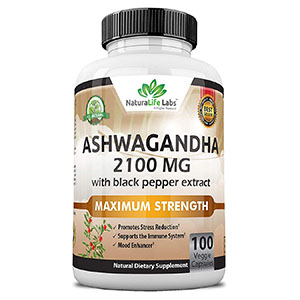
NatureLife provides a potent combination of ashwagandha root and powder derived from the whole plant in each capsule. The result is a supplement that leverages all the chemically active compounds of ashwagandha enabling you to enjoy optimal benefits. Each capsule is 700 mg with a recommended serving size of 3 capsules. Black pepper extract is also added to facilitate absorption. NatureLife Ashwagandha is free of dairy, soy, sugar, gluten, artificial ingredients and genetically modified organisms. It is also certified vegan. They are produced in the US in a Good Manufacturing Practices (GMP) facility under the supervision of the FDA. If you’re looking for a potent, highly-pure ashwagandha supplement here it is.
2. Organic India Ashwagandha
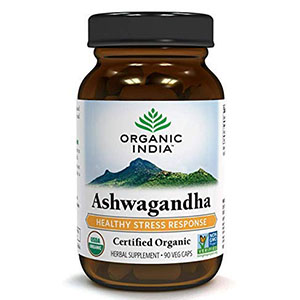
Most Ayurvedic practitioners recommend using modest amounts of ashwagandha. And that’s what you’ll get with these Organic India capsules. Each one contains 400 mg of ashwagandha with a recommended dose of 2 capsules. These are among the purest supplements on our list. They contain nothing but ashwagandha root in a vegetarian capsule. That’s it. No supplemental bells and whistles. No allergens, artificial colors or flavors, genetically modified organisms, dairy or superfluous vitamins and minerals. Just USDA certified organic ashwagandha. It’s the kind of refreshing simplicity we appreciate which is why it earns the number 2 spot on our list.
3. NutraHerbals Ashwagandha
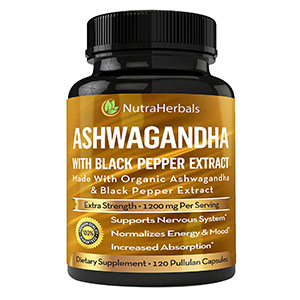
NutraHerbals deliver their high potency ashwagandha in 600 mg capsules with a touch of black pepper thrown in to aid in absorption. That’s it. There’s no good-sounding but unnecessary addons, no superfluous vitamins. The ashwagandha they use is organically grown and they use pullulan capsules which are made from a natural polymer and have no taste. The product is made and bottled in the US in a GMP facility and is completely free of all allergens, artificial ingredients and genetically modified organisms. Recommended dosage is 2 capsules once per day. So with 120 capsules you get 2 months’ worth per bottle.
4. Himalaya Ashwagandha

Himalaya subjects their ashwagandha to a much higher degree of processing than most other companies. Their goal is to increase potency. And in that sense they succeed. Each 670 mg capsule has a higher degree of bioavailability then you’ll get with other, similarly sized capsules. And while Himalaya Ashwagandha is free of genetically modified organisms, gluten, wheat, soy, dairy and other common allergens some folks aren’t going to be thrilled with all the extra processing. But if that’s not an issue for you you’re sure to enjoy this powerful organic supplement.
5. Ebysu Ashwagandha Capsules
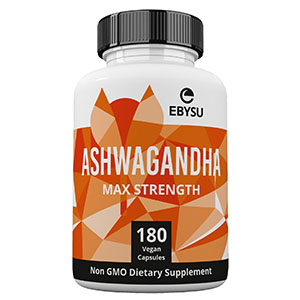
When it comes to simple ashwagandha supplements there is not a lot of distinction between the best ones. What you should be looking for is ashwagandha that’s organically sourced, free of artificial ingredients, free of common food allergens and produced in a GMP facility in the US. If it contains some black pepper to aid absorption and comes in a capsule that will pass vegan and vegetarian muster then all the better. You can check all of the above boxes with Ebysu Ashwagandha Capsules. And just for good measure toss in the fact that they’re less than a dime per capsule.
6. Sun Potion Ashwagandha Powder
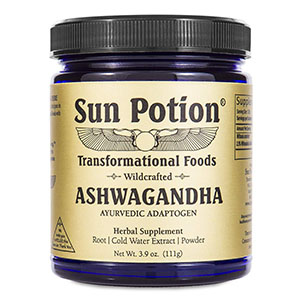
Some folks don’t like the idea of choking down a huge capsule or two (or three) every day. They prefer to supplement their diet in a kinder, gentler fashion. For them there’s Sun Potion Ashwagandha Powder. This completely organic, vegan powder mixes easily with your favorite non-carbonated beverage. Or you can add it to your protein shake and really ramp up the effectiveness of your workouts. Sun Potion Powder is made in India from organically grown ashwagandha and is completely free of genetically modified organisms, artificial additives and common food allergens.
7. NOW Supplements Ashwagandha

NOW is one of the most popular brands of supplements on the market. They’ve earned their lofty position by routinely producing products that are both pure and potent. Their ashwagandha supplement is no exception. Each capsule contains 450 mg of ashwagandha powder along with a modest amount of rice flour as filler. That’s it. The capsule itself is made from vegetable cellulose and is easy to swallow. NOW Ashwagandha is dairy free, vegan, vegetarian, kosher and contains zero genetically modified organisms.
8. Gaia Herbs Ashwagandha Root
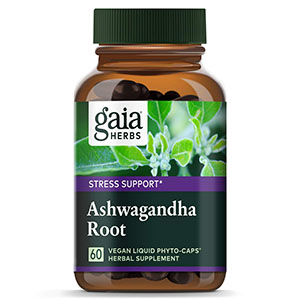
Gaia Herbs takes a slightly different approach to making their ashwagandha supplements. Instead of the usual capsule full of powder the ashwagandha extract in their veggie capsules is suspended in water. This makes it much easier on the stomach and speeds up the process of absorption. There is nothing in these capsules that should cause any type of digestive distress. Also, no artificial ingredients, fillers or food allergens and no GMOs of any kind are used at any point in the production process. Just ashwagandha extract and water.
9. Havasu Nutrition Ashwagandha
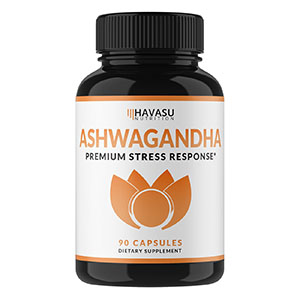
Some manufacturers add black pepper to their ashwagandha to aid in absorption. Others, like Gaia Herbs, go the liquid capsule route. Havasu takes yet another approach. They include just a hint of artichoke extract to facilitate absorption and ensure digestive harmony. Beyond that there are no troublesome ingredients, no food allergens and no GMOs. Just 500 mg of organic ashwagandha powder per capsule and the aforementioned artichoke. Be aware, however, that due to the nature of the capsule itself these are not certified vegan.
10. Four Sigmatic Adaptogen Blend Ashwagandha
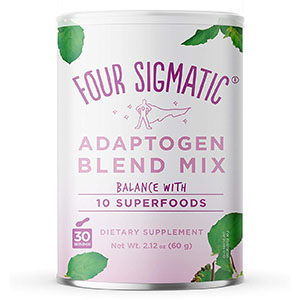
If you can overlook the marketing faux paus (“one scoop to support occasional stress”) what you’ll find here is a potent, effective ashwagandha supplement. Four Sigmatic Ashwagandha is free of common food allergens, contains no fillers and does not employ artificial flavors. It’s also caffeine free and is paleo, vegetarian and keto friendly. This is a powder that you are encouraged to mix with your favorite non-carbonated beverage. And you should. Because, while it’s quite pure it’s also quite tasteless. So if you want to make it more palatable consider mixing it with fruit juice or something of the sort.
FAQs
What is Ashwagandha?
Ashwagandha, commonly known as ‘Indian ginseng’ has been a central component of Ayurvedic medicine for centuries. It is widely prescribed for numerous conditions but its historical reputation grew from its ability to impart vitality and reduce stress (1).
The first known uses of ashwagandha occurred some 5,000 years ago. At that time it was primarily given to older individuals to help them feel more vigorous. But, as we’ll see, this potent adaptogen (2) has since found favor as a treatment for a wide variety of conditions including insomnia, inflammation, high blood glucose levels, constipation and much more.
It’s only in recent years that ashwagandha has begun to attract scientific scrutiny and – to the surprise of no one familiar with this remarkable plant – it has emerged from clinical examination with its reputation largely intact (3).
What Are the Benefits of Taking Ashwagandha?
In the ancient past Ashwagandha was renowned for its ability to impart vigor and relieve a spate of minor ailments. Over the centuries, however, numerous other benefits have come to light. Today it is believed…
Ashwagandha may reduce blood glucose levels. – This particular benefit has been widely known among practitioners of Ayurvedic medicine for centuries. Recently, it has been confirmed by clinical research (4). While the precise mechanism is still being decoded there’s little doubt of its ability to improve insulin sensitivity and reduce blood sugar levels. This has potentially profound public health implications at a time when the number of type II diabetes cases is skyrocketing (5).
Ashwagandha may help improve brain function. – Clinical research into this claim is limited. But practitioners of Ayurvedic medicine have long believed ashwagandha has the ability to boost memory and improve overall cognitive function. This benefit seems to derive at least in part from its antioxidant qualities. As antioxidants are known to counteract the negative effects of oxidative stress. As we mentioned, human clinical research is limited as of this writing. But animal studies seem to support these claims (6)(7).
Ashwagandha may help reduce inflammation. – Inflammation is a natural part of the human immune response (8). But it can also be the source of much pain and discomfort and may play a role in the onset of heart disease. Those suffering from osteo or rheumatoid arthritis know only too well the debilitating pain that can result from inflammation. Research suggests that ashwagandha may play a role in encouraging more effective immune system activity (9) which may, in turn, reduce inflammation.
Ashwagandha may lower cholesterol levels. – There have been numerous animal and human studies into this claim. What they all have in common is that they confirm the ability of ashwagandha to lower cholesterol levels. To be sure, the animal studies produced more dramatic reductions. But results from the human studies also clearly indicated a beneficial effect (10). So this is not some pie in the sky claim.
Ashwagandha increases testosterone levels. – We mentioned that ashwagandha has a long history of being used to restore ‘vitality’ in older folks. Some of that increased ‘vitality’ is of a decidedly sexual nature. Ashwagandha has been shown to boost testosterone levels and to increase sexual potency in men (11). The effects seem particularly pronounced in men who had been suffering from stress-related infertility.
Ashwagandha can help you enjoy more effective workouts. – We just mentioned that ashwagandha can increase testosterone levels. And while that has a positive effect on men’s sexual performance and potency it also pays dividends in the gym. Studies have shown that men who take ashwagandha have more effective workouts (12) and are able to increase muscle mass at a faster rate than men who do not take it.
Ashwagandha can help relieve anxiety. – Without question one of the most well-known benefits of ashwagandha is its ability to reduce anxiety and stress. Practitioners of Ayurvedic medicine have long known this to be true. And now we have copious clinical research that seems to confirm this ability beyond much doubt (13). In our uncertain world anything that can help alleviate a bit of anxiety is a good thing.
Ashwagandha may play a role in fighting cancer. – The operative word here is ‘may’ because the jury is still out. That said, there is clinical evidence to suggest a relationship between ashwagandha supplementation and a reduction in certain types of cancer cells (14). Much of the current research is encouraging and warrants keeping a close eye on. Just keep in mind that the preponderance of research at the moment is being conducted on animals. And what works in animals doesn’t always translate as effectively to humans.
Ashwagandha may help fight depression. – The same properties that enable ashwagandha to improve overall vitality and reduce stress may also help combat symptoms of depression. This is one of the least studied potential benefits of ashwagandha but centuries of anecdotal evidence strongly suggest it to be true. And it would certainly make sense that something that makes you feel more lively, engaged and less anxious might also reduce symptoms of depression. But again, the scientific evidence is still lacking.
Who Could Benefit from Taking Ashwagandha?
Reading through the above list of benefits it’s clear that ashwagandha can pay handsome dividends for lots of different people. That includes those suffering anxiety or stress in their lives. People with high cholesterol may also benefit from taking supplemental ashwagandha as may those with high or unstable blood glucose levels (15).
But the benefits of ashwagandha extend to others as well. If you are looking for a way to get more from your resistance training ashwagandha can help. That’s because, as we’ve seen, it boosts testosterone levels. It is also attractive to those suffering from stress related infertility (16). Both because it helps men regain their sexual vitality and because it can reduce stress levels in general.
Arthritis sufferers also stand to benefit from taking ashwagandha. Inflammation is a major cause of arthritis pain and suffering and ashwagandha has proven itself effective in reducing inflammation and promoting a more measured and healthy immune response. And the fact that it can bolster the immune system should get the attention of just about anyone interested in enjoying more robust health.
People suffering from depression, those dealing with anxiety and elderly folks who simply want to feel a bit more spry will all likely benefit from what ashwagandha has to offer.
How Long Does it Take to See Benefits?
Many of today’s most effective prescription drugs are the result of years of engineering on a molecular level. This molecular engineering is designed to increase both their effectiveness and the speed with which they work. When it comes to all natural supplements like ashwagandha, however, it is unrealistic to expect they are going to produce results as quickly as state of the art pharmacological wonders. It will work. But it may require a bit of patience on your part.
Many of the effects of ashwagandha are cumulative. Meaning that the more you have in your system the more effective it will be at addressing your particular health concern. But you can’t just eat a pound of it and see any benefit. It will take a month or two of moderate consumption for it to build up properly in your system. Only then will you experience the full force of its effectiveness. Once you begin to experience the benefits of ashwagandha you will likely conclude that the modest wait was worth it.
Can Ashwagandha Help You Lose Weight?
Ashwagandha by itself is not known for its weight loss properties. However, that doesn’t mean it has no role to play in an effective weight loss program. The two essential components of any such program are diet and exercise (17). If you modify your diet but don’t get in the habit of exercising too you will likely lose muscle as well as fat. Not only that but you will not lose as much weight and will stand a better than even chance of putting the weight back on.
What does this have to do with ashwagandha? Ashwagandha has been shown to increase testosterone levels. That in turn enhances your ability to get more from your workouts, including larger, more powerful muscles and greater endurance. But before you start to think that this only applies to men research has shown that women seeking to build muscle mass can also benefit from slightly elevated testosterone levels (18). Not to worry though. The increases in testosterone levels in women produced by ashwagandha will be modest at best.
Is Ashwagandha Safe to Use?
There is no compelling evidence to suggest that ashwagandha use poses any significant risk. Tens of millions of people have been using it for thousands of years. Certainly, if there were health risks involved they would have surfaced long ago. Keep in mind too that in recent years ashwagandha has been studied exhaustively by clinical researchers in labs all over the world and no particular health threat from its use has emerged during all that testing.
Are There Any Side Effects Associated with Ashwagandha?
Most all of the side effects of ashwagandha use are of the positive variety. Lower blood sugars, reduced stress and anxiety levels, more vim and vigor and the workout benefits we noted above just to name a few. At the same time most of the cautions that you hear regarding ashwagandha use tend to come from practitioners of Western medicine. While such cautions are undoubtedly well-intentioned they stem largely from unfamiliarity with the plant and its mechanisms.
That said even the most devoted and experienced practitioner of Ayurvedic medicine will advise taking only modest amounts of ashwagandha. That’s because – as is the case with almost everything – taking too much may result in an upset stomach or other types of gastric distress. So the watchword here is moderation.
It should be noted too that while ashwagandha has the ability to help stabilize blood sugars it is not a cure for diabetes. It’s primary benefit in this regard is its potential to help people avoid becoming diabetic in the first place. In addition, those currently receiving treatment for a depressed immune system should discuss ashwagandha with their doctor before taking it.
The Bottom Line
Ashwagandha has been helping people obtain a higher degree of overall health for many centuries. In recent years it has come under close scientific scrutiny and repeatedly demonstrated its wide ranging benefits.
If you suffer anxiety or stress, high cholesterol or high blood sugars or you are looking for an effective way to reduce the pain of arthritis, consider ashwagandha. Likewise if you are looking for a safe and effective way to get more from your workouts, ashwagandha can help.
All of the ashwagandha supplements on our list are safe and effective and produced by reputable manufacturers. Any one of them would be a smart addition to your dietary regime and pay generous health dividends for years to come.


0 Comments